 Call (707) 463-1322 to order any Factory Pipe ® product.
Call (707) 463-1322 to order any Factory Pipe ® product. - Products
- Yamaha
- Accessories
- Go-Ped
THINK FAST!
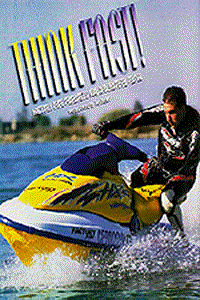 FACTORY PIPE PRODUCTS
ARE A BEAUTIFUL THING
FACTORY PIPE PRODUCTS
ARE A BEAUTIFUL THING
Text And Photos By Tom Kerker
I can't believe all the letters and phone calls I get about aftermarket exhaust systems. Hey TK, have you tried or tested this or that system? How does it work, how fast did you go? Who do you think makes the best one for my personal watercraft? I sure wish I could please everyone, but it's hard enough just trying to keep up with the amount of new watercraft models that are being
produced. Many aftermarket companies feel the same way. It seems that every time one product goes into production, they need to turn around and perfect another one.
For those particular companies involved in performance exhaust systems, this seems to be a never ending battle since exhaust upgrades are one of today's most popular upgrades. Sure rideplates, intake grates, impellers and flame arrestors are considered the norm. However, exhaust systems are usually the best bang for your buck. One company that is constantly banging away at the door of performance is Factory Pipe Products, located in Ukiah, CA. In my opinion, FPP has always been on the leading edge of technology innovation and high performance. It only stands to reason, since their sole purpose in business is performance exhaust systems.
We're all quite aware of the incredible popularity of "Sport" class PWC's. Yamaha's "Blaster" is still one of my favorite picks, but let's face it, SeaDoo's HX sensation has got so many people unloading their "Blaster" and stepping up to the HX platter. Most "Sport" class enthusiasts tend to be a little more aggressive and power hungry riders. This is exactly the type of person Factory Pipe Products caters to. When FPP owner Ross Liberty told me his new HX exhaust was ready for release, I couldn't wait to get my hot little tech fingers on one. Ross didn't say much except that I was going to be surprised with the results. For those of you who don't know Ross, he doesn't mess around when it comes to aftermarket exhaust systems. Some people say he takes things a little too seriously, fortunately for us their systems are incredible. So, let's cut to the chase and get into the facts.
FACTUAL REALITY
Those of you familiar with my tech/test features, already know how the story goes. For those of you who aren't, it's really quite simple. Take a bone stock watercraft, record a few baseline tests (top speed, rpm and acceleration), then install the aftermarket part and compare the overall results. This way you get to see exactly what the targeted part is doing for you. Simple and highly effective.
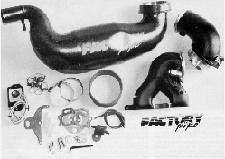 "Factory Pipe Products HX system comes with everything you need to bust into the 57 mph arena! This system is so well designed, that reliability, leaks, or coupler problems are a thing of the past. Their 720 system also utilizes a micro processed, rpm controlled E.C.W.I. (Electronically Controlled Water Injection). This high-tech advancement raises the low/midrange torque curve, without affecting top speed numbers" |
I met up with FPP's John Richard's "JR" at one of my top secret test sites. I want to extend a big thanks to him for coming such a long way, on short notice. What a trooper! John and I started out the test with my friend George Delfino and his soon to be revitalized stock HX. Just for the record, our '95 HX only had about 10 hours of total running time. Basically just broken in and running strong. The top speed was approximately 52.7 mph and turning 6810 rpm on the tachometer. The TK 100 yard Dash acceleration test came in at 6.9 seconds. Other than the weather being a steaming 48 degrees, the water conditions were perfect and there was nobody in sight. Just the way I like it! John immediately got to work and started to transform our test vehicle. While John was busy removing the OEM exhaust, I checked out all the fine workmanship of the new FPP system. These days I get many people asking me why aftermarket exhaust systems are so costly. I usually reply that most systems on the market are well worth the investment. Sure some systems are better than others but it's what's behind the product that matters. FPP spends untold hours of research and development to ensure a good product. Products that not only provide killer power, but a good fit, on the mark tuning and installation support, plus great reliability. When you add up all these bennies, you're investing in a product that's worth every penny!
Let's get into a little detail about the Factory Pipe Products HX system. What makes this system unique is the ECWI, (Electronically Controlled Water Injection) an FPP original! What this microprocessor controlled system does, is inject water at lower rpms, therefore changing the internal temperature of the chamber body. Lowering and changing the temperature causes the sonic wave (inside the chamber) to travel at a much slower rate. This reduced wave rate helps improve bottom and midrange throttle response. Now, while the engine is running into the higher rpm range, the chamber body is still being cooled by the incoming water. However, at 5800 rpm the ECWI cuts off the supply of water, causing the internal temperature of the chamber to go up.
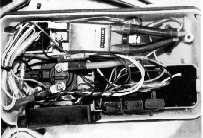 The ECWI processor/brain unit in housed in the OEM electrical box. This high-tech unit comes completely sealed with waterproof connectors. Wiring the unit is simple and idiot proof. They require very little power to operate and they can remain hooked up to the battery for long periods, without worry of power drain! |
Having hotter chamber temps create greater top end and rpm. With the ECWI unit controlling the water flow, it's now possible to have strong low/midrange, without sacrificing top speed. The ECWI plays an important role in the overall performance of the FPP HX system. Ross has incorporated these units into many of his other systems. Just in case you missed out, check out my March '96 FPP/ECWI tech feature for more details and it's other retrofit applications. For our HX, the ECWI brain or microprocessor fit in the OEM electrical box. All the necessary connections were included and even the biggest of bozos could follow the wiring instructions. It's definitely installer friendly!
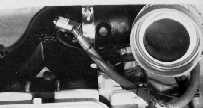 Here is the manifold and headpipe installed on our stock 720HX. In the center of the manifold is the ECWI water injector solenoid. Also note the double seal/coupler for the chamber body. When installed properly, this provides the ultimate headpipe to to coupler reliability. |
During the install JR explained to me some other fine points of their system. One thing that really helps improve exhaust reliability is how the components are designed and manufactured. FPP uses one of the most bulletproof coupler designs on the market. The manifold and headpipe are joined by part of the OEM clamp setup. This has proven to be a real winner, the chamber body has an internal silicone ring, plus the outside coupler. JR says that if you end up with a leaking coupler, chances are it wasn't' installed or seated properly. Over the years I've installed hundreds of exhaust systems and I'm confident this setup will not leak, if it's installed right the first time. There isn't a whole lot more to boast about, except for the fact that FPP has thought about every possible little detail. The system fit like a glove and looked great sitting in the engine compartment.
The next phase was to rejet the carbs. JR, being an ace at changing jets, only had to remove the rear carburetor. To simplify your life, we recommend removing the carbs and setting them up on your workbench. FPP recommends you bump the main jet size to 137.5 Everything else remains the same, low speed jets, needle/seats and springs. JR swapped the jets, made some other minor needle adjustments to the high speed circuit and the carbs were finished. (Please note: Factory Pipe has updated this jetting since the article was done, please contact FPP for more info) Any other bolt on mods dramatically changes the engine's values. If your not sure, have someone well qualified make the proper adjustments!
Factory Pipe Products has networked their system with the OEM waterbox. They feel this setup works best, plus it remains quiet. Like a kid with a new toy, we were eager and more than ready to finish off the final testing. JR cranked it over and gave a thumbs up to hit the water.
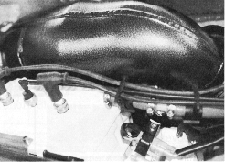 It's a tight fit, but that's how you make horsepower! The FPP 720 system fit like a glove and the installation was smooth; thanks to FPP's detailed instructions, it can be installed by anyone |
HISTORY IN THE MAKING
No need for a big intro here, JR made a couple of minor needle adjustments to the carbs and our HX was running like a batoutohell! The rpms jumped from 6810 to 7280, the 100 Yard Dash test dropped from the high sixes, to a remarkably low 6.15 seconds. The overall performance gain was very noticeable down low and through the mid range, where the response was instantly felt right at your fingertips. Top speed was also nothing short of great, at least 4 more mph. We went from a strong 52.7, to a consistently outrageous 57 mph! For all you "Sport" class fanatics, this is an aftermarket part you'll never want to be without. Just think about it, a stock engine with only an added exhaust system, running 57 mph, all day long! If you owned a "Blaster", the dollar figures would be well into the thousands, just to break the lower 50 mph mark!
FACTORY PIPE 720HX EXHAUST SYSTEM TEST RESULTS
Stock Top Speed Runs 52.8 / 52.7 / 52.3 / 52.5 / 52.6
FPP Top Speed Runs 56.9 / 57.0 / 56.7 / 57.1 / 56.6
Stock Top Speed RPM 6810
FPP Top Speed RPM 7280
TK 100 Yard Dash Stock 6.90 / 6.93 / 6.96 / 6.87 / 6.84
TK 100 Yard Dash FPP 6.10 / 6.13 / 6.12 / 6.18 / 6.15
Note: All test results performed by John Richards of Factory Pipe, Tom Kerker and George Delfino. Radar data recorded by "Radar Sales/Stalker Gun."
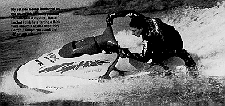 My test rider George Delfino put on the moves with his newly powered HX. George is a big time "Blaster" fan, but I think he's starting to think twice about his new HX setup. Hey George, I thought you bought that HX for your wife! |
So what about an HX with some other minor bolt on parts? Without a doubt the HX has plenty of hidden potential, without sacrificing reliability and spending big bucks. I've heard of many people that own "Limited" style HX's pushing the 58 to 59 mph envelope! For this feature I wanted to focus on the incredible gains that FPP has developed for a stock based craft. FPP spends countless hours on the dyno testing when they develop any of their exhaust systems. FPP claims the key or major goal to making torque, horsepower and rpm is raising the internal cylinder pressure. This is easier said than done, especially when you're trying to maintain 92 octane fuel compatibility, yet retain longevity. Any time cylinder pressure is raised detonation becomes an extreme factor. The greater your cylinder pressure, the greater risk of detonation. One way to solve this is to use a higher octane rated fuel, but not everyone can afford or wants to run expensive/exotic racing fuels. Detonation or more commonly known as "pinging" can sometimes go unheard. Unlike you car's engine, which is more audible, it only takes a few seconds to severely ruin your two cycle engine.
FPP's new 720 system is a fine example of greater cylinder pressure vs. octane rating. Developing all their horsepower around a stock 720 format, FPP came up with a total of 107 horsepower at 7100 rpm, with flawless reliability! FPP realizes that many people will be installing other bolt on parts, but shop/owner discretion is advised. This is not to say that they do not recommend aftermarket parts, but you have to keep in mind that FPP is not in the business of testing aftermarket parts. Their goal is to make as much power and reliability from a stock based engine.
The rest is up to the shop/owners. If you're the type who always wants the best, FPP is a great way to start out your HX's performance package. If you're satisfied with our test results that's OK, too. Anyway you look at it, Factory Pipe Product's new 720 HX system is going to remain in the history books for quite sometime to come. And that's a beautiful thing!
Tel: 707-463-1322, Fax: 707-463-1384, E-mail: Click here